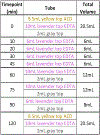Methods to characterize lactate turnover in aging and Alzheimer's disease; The LEAN study
- PMID: 39236780
- PMCID: PMC11938302
- DOI: 10.1016/j.cct.2024.107682
Methods to characterize lactate turnover in aging and Alzheimer's disease; The LEAN study
Abstract
Background: There is evidence that chronic exercise can benefit the brain, but the effects vary markedly between studies. One potential mechanism for exercise-related benefit is the increase in systemic lactate concentration that is well-characterized to occur during exercise. Lactate is known to cross the blood brain barrier and can be used readily as a fuel for neurons. This may be particularly important in Alzheimer's Disease, which is characterized by cerebral hypometabolism. However, little is known about how whole-body lactate metabolism differs between older adults and individuals with cognitive impairment. This information is critical when considering potential differences in responses to exercise in various cognitive diagnosis groups.
Methods: Here we describe the use of a "lactate clamp" procedure to adjust blood lactate levels to approximate those achieved during exercise, but while at rest. This trial will compare lactate oxidation between cognitively healthy older adults and cognitively impaired participants. We will further evaluate the effect of acute lactate infusion on cognitive performance.
Discussion: The findings of the study described here, the Lactate for Energy and Neurocognition trial (clinicaltrials.gov # NCT05207397) will add to our understanding of systemic lactate mechanics in cognitively healthy older adults and individuals with Alzheimer's Disease. These findings will be applicable to ongoing exercise trials and to future studies aimed at modulating systemic bioenergetic function in aging and Alzheimer's Disease.
Keywords: Alzheimer's disease; Brain; Exercise; Lactate; Metabolism.
Copyright © 2024. Published by Elsevier Inc.
Conflict of interest statement
Declaration of competing interest The authors declare that they have no known competing financial interests or personal relationships that could have appeared to influence the work reported in this paper.
Figures


References
-
- Alzheimer's, A., 2016 Alzheimer's disease facts and figures. Alzheimers Dement, 2016. 12(4): p. 459–509. - PubMed
-
- Yan J., et al. , Effect of Multicomponent Exercise on Cognition, Physical Function and Activities of Daily Life in Older Adults With Dementia or Mild Cognitive Impairment: A Systematic Review and Meta-analysis. Arch Phys Med Rehabil, 2023. 104(12): p. 2092–2108. - PubMed
-
- Zeng Y., et al. , Effects of physical activity interventions on executive function in older adults with dementia: A meta-analysis of randomized controlled trials. Geriatr Nurs, 2023. 51: p. 369–377. - PubMed
-
- Pellerin L., et al. , Activity-dependent regulation of energy metabolism by astrocytes: an update. Glia, 2007. 55(12): p. 1251–62. - PubMed
Publication types
MeSH terms
Substances
Associated data
Grants and funding
LinkOut - more resources
Full Text Sources
Medical

